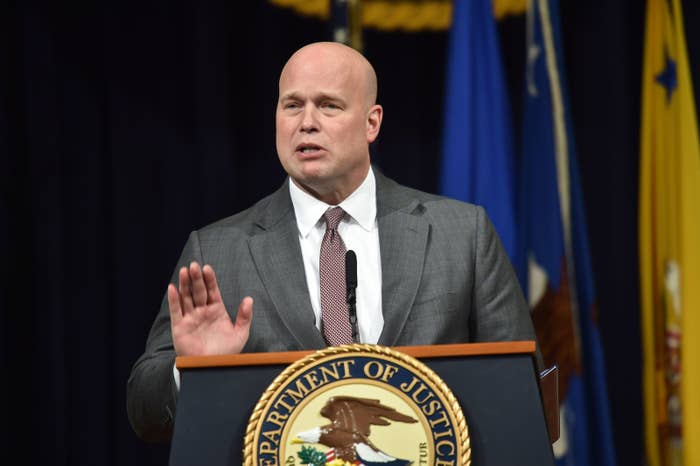
Lawyers on Friday brought a challenge to the validity of President Donald Trump’s appointment of acting attorney general Matthew Whitaker to the Supreme Court.
Questions have surrounded the legality of Whitaker’s appointment since the day after the midterm elections when Trump forced out the former attorney general, Jeff Sessions, and announced on Twitter that Whitaker was his choice to be the acting attorney general. The Justice Department, however, has defended the appointment's legality.
“Because Whitaker’s appointment does not satisfy the Appointments Clause, it is unlawful, and he cannot serve as Acting Attorney General,” the lawyers wrote in Friday evening’s filing.
The issue is being brought to the Supreme Court in Barry Michaels’ pending petition for certiorari in a case challenging the federal law barring possession of a gun by a felon. In addition to Michael Zapin, Michaels’ lawyer on previous filings, Tom Goldstein and his colleagues at Goldstein Russell joined in Friday’s filing.
Goldstein and the firm earlier this week had joined the Maryland attorney general in challenging Whitaker’s appointment in a different case before a trial judge. They argued in that filing that the appointment violates both a federal law setting the order of succession at the Justice Department — it includes only other people whose positions require Senate confirmation — and the Constitution’s Appointments Clause, which requires the Senate to provide advice and consent on principal officers of executive branch departments. Whitaker, as Sessions' former chief of staff, was not confirmed by the Senate for his position.
In Friday’s filing at the Supreme Court, the lawyers made similar arguments, specifically raising the issue by asking the court to declare that Deputy Attorney General Rod Rosenstein, and not Whitaker, should be substituted as the respondent in the case for those reasons.
The Justice Department has pushed back against the legal criticism of the appointment, making public a memorandum from the department's Office of Legal Counsel on Nov. 14 that concludes the appointment is legal under a different law, the Federal Vacancies Reform Act of 1998, that allows the president to make such "acting" appointments — including a provision that allows senior officials who have worked in a department for at least 90 days, even those who have not been confirmed by the Senate, to serve as acting officers. The memo went on to conclude that the appointment also is constitutional under the Appointments Clause because an "acting" officer like Whitaker is an inferior officer who Congress has authorized to be appointed without Senate confirmation.
Additionally, the lawyers also ask the justices to take up the case without waiting for lower courts to rule, as it ordinarily would, because the issue is “a pure question of law” and could arise in “thousands” of cases.
Noting the many “personal responsibilities” of the attorney general, they warn, “If this Court declines to resolve this question immediately and instead determines several months in the future that Mr. Whitaker’s appointment was always invalid, then ‘unwinding’ all of those personal orders would be a fraught and disruptive exercise that could embroil the federal courts in innumerable collateral disputes.”
UPDATE
The article was updated to include more information about the legal issues in dispute with President Donald Trump's appointment of Acting Attorney General Matthew Whitaker.
